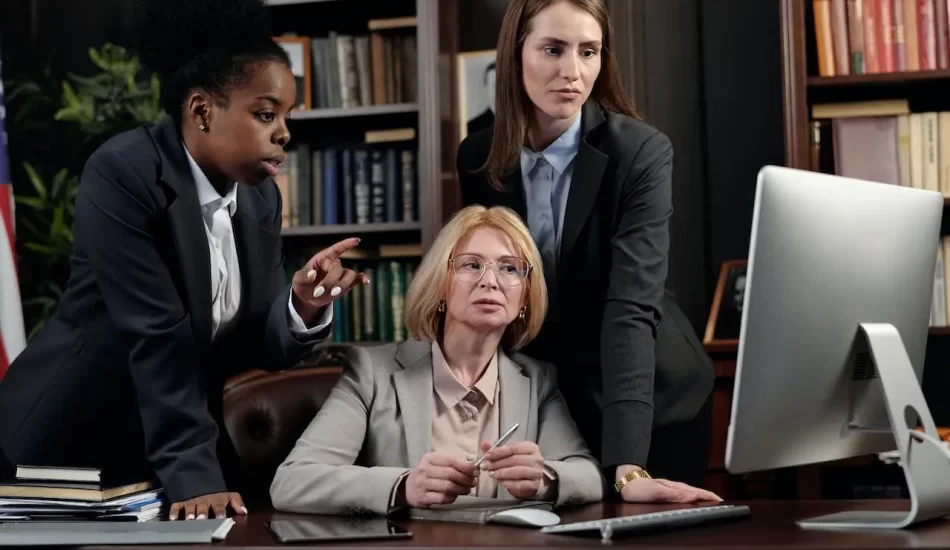|
|
Last Modified on Sep 22, 2025
DUI, or Driving Under the Influence, is a serious offense that carries significant legal consequences, potentially impacting your freedom, finances, and future. DUI charges stem from driving a vehicle while impaired by alcohol or drugs, with blood alcohol concentration levels exceeding legal limits. The consequences of a DUI conviction can include hefty fines, license suspension, mandatory alcohol education programs, and even imprisonment.
Additionally, a DUI conviction can result in a tarnished criminal record, affecting your employment prospects and personal life. It is imperative to approach this legal predicament with a well-prepared defense strategy and the guidance of an astute DUI defense attorney. Seasoned attorneys like Louis J. Goodman simplify the time-consuming and mind-boggling complexities of DUI defenses, acting as a buffer between the courts and individuals facing charges
This article will walk you through foolproof DUI defense strategies tailored for both first-time offenders and those facing multiple DUI charges.
Understanding DUI Laws in California
Driving under the influence (DUI) is a grave offense in California, and comprehending the state’s DUI laws is paramount for a DUI defendant.
DUI Laws and Blood Alcohol Concentration (BAC) Limits
In California, the legal limit for most drivers aged 21 and over is 0.08%. For commercial drivers, it’s lower at 0.04%, while those under 21 must maintain a BAC of 0.01% or lower. These limits serve as crucial thresholds in determining whether a driver is operating a vehicle under the influence.
California also imposes “zero tolerance” laws for drivers under 21, making it illegal for them to operate a vehicle with any detectable alcohol in their system. Furthermore, for individuals on probation due to a previous DUI conviction, a BAC of 0.01% or higher is considered a violation.
Legal Process Following a DUI Arrest
After a DUI arrest in California, individuals navigate a multi-step legal process. It typically begins with an arraignment, during which the charges are formally presented, and individuals enter their pleas. Subsequent pre-trial proceedings involve evidence gathering, negotiations, and potential plea bargains. If a resolution isn’t reached, the case proceeds to trial, where evidence is presented, witnesses testify, and a verdict is rendered.
Chemical Testing and Implied Consent
California relies on various chemical tests, including urine, blood and breath tests, to determine a driver’s blood alcohol concentration (BAC). The state operates under the implied consent law, requiring drivers to submit to these tests when lawfully requested by law enforcement.
The arresting officer typically administers a field sobriety test, such as the walk-and-turn or one-leg stand, to assess a driver’s physical coordination and potential impairment during a DUI stop. Refusal to comply with chemical testing can lead to additional penalties, including license suspension.
Potential Penalties for DUI Offenses in California
The penalties for DUI offenses in California can be severe, particularly for first-time offenders. These may include:
License Suspension
A first-time DUI conviction can result in a driver’s license suspension for up to six months.
Fines
Fines can range from hundreds to thousands of dollars, not including court fees and other associated costs.
Probation
Probation, often lasting three to five years, may include mandatory alcohol education programs.
Jail Time
While not mandatory for first-time offenders, several aggravating factors can elevate a DUI offense to one that entails jail time. These factors may include an exceptionally high blood alcohol concentration (BAC), multiple DUI convictions within a specific timeframe, causing accidents resulting in injuries or fatalities, driving with a suspended or revoked license, or displaying reckless behavior during the arrest.
Ignition Interlock Device (IID)
In California, drivers convicted of DUI offenses may be required to install an ignition interlock device (IID) in their vehicles. This device mandates a breathalyzer test before starting the vehicle, ensuring sobriety. The specific circumstances under which an IID is required can vary but often include multiple DUI convictions or exceptionally high BAC levels.

Immediate Steps to Take After a DUI Arrest
A DUI arrest in California is a serious matter, and the immediate steps you take can significantly impact the outcome of your case.
Understand the DMV Process
After a DUI arrest in California, your driver’s license is at risk of suspension. Understanding the Department of Motor Vehicles (DMV) administrative process is essential. You have a limited window to request a DMV hearing to contest the suspension. Your attorney can assist you in navigating this process, potentially preserving your driving privileges while your case is pending.
Preserve Crucial Evidence
Preserving evidence related to your DUI arrest is crucial for building a strong defense. This includes collecting any paperwork provided by law enforcement, such as the arrest report and citation.
It’s also vital to gather witness statements, if applicable, and any other evidence that might be relevant to your case. Additionally, documenting the details of the arrest, such as the location, time, and interactions with law enforcement, can serve as valuable records for your defense.
Refrain From Making Incriminating Statements
During and after your DUI arrest, it’s essential to exercise your right to remain silent. Avoid making any statements to law enforcement that could potentially incriminate you. Be polite and cooperative, but remember that you are not obligated to provide self-incriminating information.
Anything you say can be used against you in court, so it’s generally advisable to consult with your attorney before making any statements.
Engage a DUI Defense Attorney
One of the most critical actions you can take after a DUI arrest is to promptly seek legal counsel. At the Law Office of Louis J. Goodman, our dedicated legal team meticulously examines the evidence collected at the arrest scene, police reports, and the arresting officer’s conduct to ensure the accuracy and reasonability of your initial arrest. We focus on crucial areas of the DUI investigation such as testing procedures, police behavior, and environmental conditions.
Given his professional stature as a former Alameda County Deputy District Attorney, Louis Goodman can skillfully negotiate with judges and prosecuting attorneys to secure favorable plea bargains even in your absence. If you’d like to gain specialized insight on complex aspects of your DUI defense, book a free consultation with Louis Goodman today.
DUI Defense Strategies for First-Time Offenders
Facing a first-time DUI offense in California can be a daunting experience, but with the guidance of an experienced DUI defense lawyer, you can explore strategic DUI defenses and work toward minimizing the adverse impact.
Challenging the Validity of the Traffic Stop
The foundation of a strong defense often begins with questioning the legality and validity of the initial traffic stop. The police officer must have a reasonable suspicion or probable cause to stop a vehicle.
If the stop was made without proper justification or a traffic violation, it could potentially render subsequent evidence, including field sobriety tests and BAC results, inadmissible in court. Your DUI attorney can scrutinize the circumstances surrounding the stop, looking for any violations of your rights or procedural errors.
Questioning Sobriety Test Results
Sobriety tests, such as a field sobriety test, blood test, breath test, and preliminary alcohol screening (PAS) tests, are commonly used during a DUI stop. However, these tests are not foolproof and can be subject to human error or external factors. Challenging the validity of these test results is a crucial defense strategy.
Your DUI lawyer can investigate whether the tests were administered correctly and consider factors like adverse environmental conditions, physical or medical conditions, or even nervousness that may have affected your performance.
Examining Breathalyzer Accuracy
Breath test results play a pivotal role in DUI cases, but their accuracy can be contested. Calibration issues, maintenance records, and operator errors are potential factors that can impact the reliability of a breathalyzer reading.
A skilled DUI attorney can delve into these details, seeking potential flaws in the testing process that can be leveraged in your defense. If the accuracy of the breathalyzer test is brought into question, it can weaken the prosecution’s case significantly.
Plea Bargains
Plea bargains can offer a strategic way to mitigate the consequences of a DUI conviction. The DUI attorney can negotiate with the prosecuting attorney to secure a plea deal that may result in reduced charges or penalties.
This negotiation may involve agreeing to attend alcohol education programs, perform community service, or accept probation in exchange for a less severe sentence. Plea bargains can be a pragmatic approach to avoid the full brunt of the legal consequences.
Preventing License Suspension
A critical concern for first-time DUI offenders is the potential suspension of their driver’s license. Your attorney can advocate for alternative measures to prevent or minimize the suspension, such as requesting a DMV hearing to contest the administrative suspension or exploring the possibility of obtaining a restricted driver’s license for essential purposes, like work or medical appointments.
The Rising Blood Alcohol Defense
One of the most practical DUI defenses, the rising blood alcohol defense involves examining the timing of alcohol consumption. Rising blood alcohol content (BAC) is a phenomenon where alcohol continues to be absorbed into the bloodstream after driving.
If your BAC was below the legal limit while driving but exceeded it later, your attorney may argue that you were not over the limit at the time of driving, challenging the DUI charges.
Demonstrating Lack of Impairment
If your attorney can establish that your driving was not impaired despite registering a BAC above the legal limit, it can weaken the prosecution’s case. This might involve presenting evidence of your good driving behavior, coherent speech, and the absence of typical signs of impairment during the traffic stop.
Severe Scenarios: Drunk Driving Accidents
In cases involving accidents caused by drunk driving, the legal stakes become significantly higher than a DUI case. If someone was injured or killed due to your actions while driving under the influence, the consequences can be severe, including felony charges and substantial prison time.
In such scenarios, defense attorneys can explore strategies like accident reconstruction, eyewitness testimonies, or expert witnesses to challenge the prosecution’s case and potentially reduce the charges or penalties.

What Are The Penalties for Multiple DUI Offenses?
Repeat DUI offenders in California face increasingly severe penalties and challenges, demanding a comprehensive and strategic defense.
Understanding the escalating penalties for repeat DUI offenses is vital for mounting an effective defense. Beyond the increase in license suspension periods, jail time, and fines, it’s essential to consider other implications:
Felony Charges
In some cases, multiple DUI convictions can elevate the charge from a misdemeanor to a felony, resulting in more substantial penalties and the potential for state prison sentences.
Impact on Employment
Felony convictions can have long-lasting repercussions on your employment prospects, as many employers conduct background checks that may reveal your criminal history.
Professional Licenses
Individuals with professional licenses, such as healthcare or legal professionals, may face additional consequences, including license suspension or revocation.
DUI Defense Strategies for Repeat Offenders
Understanding the escalating penalties, effective strategies for challenging prior convictions, and insights into mandatory alcohol treatment programs are vital components of successful DUI defenses.
Retroactive Expungement
Retroactive expungement is a legal process that allows individuals with prior convictions to seek the removal of those convictions from their criminal record. While it doesn’t erase the past, it can significantly improve your legal standing.
This approach involves petitioning the court to set aside your prior DUI conviction. Once granted, the conviction is dismissed, and your record is updated to reflect the dismissal.
A retroactively expunged conviction can portray you in a more favorable light during negotiations or sentencing. Potential employers or licensing agencies may view your record more positively, enhancing your career prospects.
Negotiating Reductions
Negotiating reductions is a collaborative process with the prosecuting attorney to secure favorable terms in your current DUI case. It centers on leveraging your commitment to addressing prior convictions to reduce charges or penalties.
The DUI lawyer communicates with the prosecutor to explore options for reduced charges or penalties. Negotiations may lead to a plea bargain, where you agree to certain conditions or outcomes in exchange for a less severe sentence. The prosecutor considers factors such as your willingness to complete alcohol treatment programs or probation.
Negotiating reductions can lead to lighter sentencing, reducing jail time, fines, or probationary periods. It can expedite the resolution of your case and provide a more predictable outcome.
Mandatory Alcohol Treatment Programs
Navigating mandatory alcohol treatment programs effectively can significantly impact your defense. Here are some insights into the process:
Program Selection
Engage with your attorney to select an appropriate treatment program, ensuring it aligns with your needs and can be completed successfully.
Compliance Matters
Fulfilling program requirements diligently is crucial, as non-compliance can lead to more severe penalties and repercussions.
Mitigating Sentencing
A successful completion of an alcohol treatment program can sometimes lead to reduced jail time or probationary periods, demonstrating your commitment to rehabilitation.
Engaging Expert Witnesses
Engage expert witnesses who can testify on your behalf. These experts can challenge the prosecution’s evidence, question the accuracy of sobriety tests or breathalyzer results, and provide professional insights that strengthen your defense.
Presenting Character References
Present character references to demonstrate your commitment to rehabilitation and responsibility. These references can highlight your positive attributes and support your case during sentencing.
The Significance of Hiring the Right DUI Attorney
For individuals facing DUI charges, particularly repeat offenders, the legal complexities involved in the process can be overwhelming. Without the guidance of an experienced and dedicated defense attorney, dealing with these challenges can seem insurmountable.
Negotiating Plea Bargains and Challenging Evidence
Experienced DUI attorneys deploy a range of tactics to build a valid defense. They leverage their expertise and extensive networks to negotiate plea bargains that can lead to reduced charges or penalties.
Moreover, they thoroughly examine the evidence against their clients, challenging its validity to create reasonable doubt. This may include scrutinizing field sobriety tests, questioning the accuracy of breath tests, or identifying procedural errors that can weaken the prosecution’s case.
Strategic Approaches
DUI attorneys employ strategic approaches tailored to each case. They may investigate the conduct of the DUI arresting officer, gather witness testimonies, or consult with expert witnesses to challenge the evidence gathered during the DUI investigation.
Protecting Your Future
Beyond legal strategies, hiring the right DUI defense attorney is crucial for safeguarding your future. A DUI conviction can have far-reaching consequences, including license suspension, employment challenges, and damage to your personal and professional reputation. A skilled attorney can work tirelessly to minimize these repercussions and help you move forward with your life.
The right DUI defense attorney provides not only legal expertise but also invaluable peace of mind. Knowing that a knowledgeable advocate is fighting on your behalf can alleviate the emotional burden that often accompanies legal proceedings.

Final Thoughts
DUI charges and convictions ripple through every aspect of life, wreaking havoc on personal, financial, professional, and legal fronts. These repercussions disrupt family life, creating a profound impact that cannot be underestimated. A DUI charge can bring forth feelings of guilt, shame, and anxiety, straining personal relationships and undermining mental well-being.
To harness the power of expert guidance and explore the defense strategies tailored to your unique circumstances, we encourage you to reach out to Louis J. Goodman for a personal interview. During this consultation, he will discuss your case, propose defense strategies, and provide a transparent written statement of fees.
Don’t let DUI charges define your future; let Louis Goodman’s expertise be your shield against the storm: CALL – 510.582.9090









